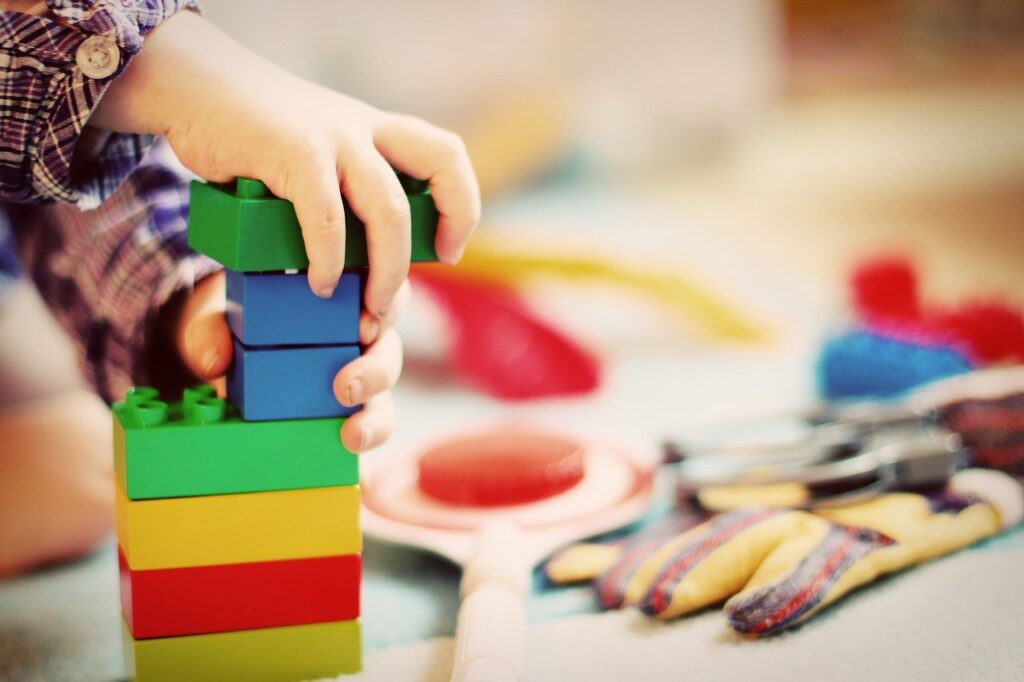Early childhood is a crucial period for cognitive, emotional, and social development. During this formative time, children’s brains are like sponges, absorbing information and experiences at a remarkable rate. One powerful tool that educators at the preschool in North Potomac, MD leverage, to foster this development, is educational toys. These toys not only entertain but also engage and educate, making them essential for preschool-age children.
Understanding the Importance of Educational Toys
Let’s start off by discussing the importance of age-appropriate toys in early childhood development, and highlighting specific examples that enhance learning and creativity. We’ll then explore how day care centers and preschools leverage these toys to provide enriched learning experiences for young minds.
For administrators and teachers at the preschool in Potomac, MD, educational toys play a pivotal role in stimulating various aspects of a child’s development. Here’s why they are so crucial:
- Cognitive Development: Age-appropriate toys challenge children’s problem-solving skills, spatial awareness, and understanding of cause and effect. For instance, puzzles, building blocks, and shape sorters help develop cognitive abilities by requiring children to analyze, strategize, and make connections.
- Language and Communication Skills: Toys like picture books, puppets, and games encourage language development and communication skills. They introduce vocabulary, promote storytelling, and foster social interactions among children.
- Fine Motor Skills: The preschool at North Potomac, MD encourages many activities that involve grasping, stacking, and manipulating objects, such as building sets, threading beads, and playdough. They enhance fine motor skills and hand-eye coordination.
- Creativity and Imagination: Toys that allow open-ended play, such as art supplies, dress-up costumes, and pretend-play sets, nurture creativity and imagination. They provide children with the freedom to explore, invent, and express themselves.
Finally, toys aid in social and emotional development. Cooperative games, role-playing toys, and dolls facilitate socialization and empathy building. These toys teach children important lessons in sharing, empathy, and understanding emotions.
Specific Educational Toys Matter
Now, let’s explore some specific examples of educational toys, employed by the curriculum of the preschool in Potomac, MD, that are particularly beneficial for preschool-age children:
- Building Blocks: Classic toys like wooden blocks or Lego sets promote spatial awareness, creativity, and problem-solving skills. Children can experiment with building structures, patterns, and even simple machines.
- Play Kitchen Sets: Pretend-play toys like kitchen sets offer opportunities for imaginative play and role-playing. Children can mimic adult activities, engage in pretend cooking, and learn about food and nutrition.
- Art Supplies: Crayons, markers, paints, and modeling clay encourage artistic expression and fine motor skills. Art activities also promote self-expression and boost confidence in children.
Oher options include musical instruments and STEM toys. They enhance auditory discrimination, coordination, and sensory integration, and introduce children to fundamental principles of math and science in an engaging way.
Making Toys Part of Learning
The staff at the preschool in North Potomac, MD understand that educational toys are not just playthings; they are powerful tools for fostering early childhood development. By providing age-appropriate toys that stimulate learning, creativity, and social interaction, day care centers and preschools create enriched environments where young children can thrive. Whether it’s building blocks, art supplies, or STEM toys, these educational tools lay the foundation for a lifetime of curiosity, exploration, and learning.


Comments are closed.